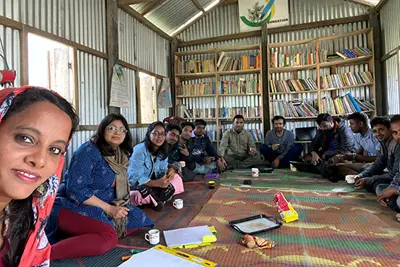Greeley Peace Scholar Fatemeh Shams is a Poet, Professor and Feminist Activist
 Image by K. Webster
Image by K. Webster
04/16/2024
By Katharine Webster
The “Woman, Life, Freedom” movement in Iran is much more than a “tug of war” over whether women should be required to wear the hijab, said exiled poet, scholar and feminist activist Fatemeh Shams at the annual Day Without Violence lecture.
It is a broad movement seeking social justice for many marginalized groups, said Shams, the 2024 Greeley Scholar for Peace Studies.
“I stand here with my Iranian and Afghan sisters, past and present, alive and dead, and all those who devote themselves fearlessly to ending gender apartheid in Iran and Afghanistan,” Shams said. “We carry no weapons; we arm ourselves with words.”
 Image by Social Media
Image by Social Media
Shams shared the tumultuous journey of many Iranian women activists, from the late 19th century up to the emergence of the Woman, Life, Freedom movement in 2022, including a powerful image of “the girl of Revolution Street,” Vida Movahhed.
In 2017, Movahhed climbed onto an electrical box on Enqelab (Revolution) Street in the center of Tehran, removed her hijab, tied it to a stick and waved it silently in the air for hours. She was imprisoned for a year, but her photo spread on social media, inspiring more such protests.
The protests came to a head in 2022 after the death in police custody of 22-year-old Mahsa Jina Amini, a Kurdish-Iranian woman who was arrested and beaten by the “morality police” for showing a few strands of hair.
“One woman became all women, and all women became all victims of state violence over decades,” Shams said.
At Amini’s funeral, many Kurdish-Iranian women removed their hijabs, or headscarves, and chanted “woman, life, freedom,” a longtime slogan of Kurdish women seeking social justice in Turkey, Syria and Iraq, Shams said.
Today, the Woman, Life, Freedom movement is largely led by young women, especially high-school students, she said. And for the first time in Iran’s history, women, men, labor unions, teachers, queer activists, environmental activists and religious and ethnic minorities are marching side by side in recognition that they are all seeking social justice and human dignity.
“Our intersectionality is our base value,” Shams said. “This movement is a paradigm shift as significant as the 1979 Iranian Revolution” that overthrew Shah Mohammad Reza Pahlavi and replaced the monarchy with an Islamic government.
Many women who fought for the 1979 revolution saw their rights dismantled overnight by the new theocratic regime, and women were the first group to protest against it, she said.
 Image by K. Webster
Image by K. Webster
“Iranian women had to fight against both state-imposed unveiling and veiling campaigns within less than 50 years,” she said.
Shams played a video of the song that became the unofficial anthem of Woman, Life, Freedom shortly after Amini’s death. “Baraye,” by the Iranian singer Shervin Hajipour, was based on people’s Twitter posts calling for freedom and justice.
“By interconnecting all pain and suffering in one song, Hajipour reminded every Iranian that the Islamic Republic’s divide-and-conquer strategy of control is no longer working,” Shams said. “Now, everyone is united over a shared cause.”
Last month, Hajipour, who won a 2023 Grammy for “Baraye,” was sentenced to more than three years in prison for “inciting unrest against national security” and “spreading propaganda against the regime.”
 Image by K. Webster
Image by K. Webster
In addition to UMass Lowell students and faculty, two student groups from Innovation Academy Charter School in Tyngsboro, Massachusetts, came to the Day Without Violence lecture. One student asked what they could do to help women in Iran.
Shams urged them to educate themselves and others and raise awareness about the complexity of the Woman, Life, Freedom movement and its nonviolent nature. She warned against foreign military intervention – and against lining up behind any particular faction of Iranians in exile that seeks to seize power.
Ordinary Iranians seek self-determination, not another top-down regime change, she said.
“Iranian women don’t need rescuing; they are rescuing themselves,” Shams said.
Shams is an award-winning poet and associate professor of Persian literature and gender studies at the University of Pennsylvania. An activist since her student days, she has been in exile since June 2009 because of her involvement in Iran’s Green Movement, which led to state-sponsored persecution of her and her family members.
After Amini’s death in September 2022, Shams joined with other Iranian feminists and queer activists to draft the Iran Bill of Women’s Rights on behalf of the Woman, Life, Freedom movement.
Last year, she joined the Board of Directors of the Women’s Learning Partnership, an international consortium of women’s rights organizations in the Global South. She was also awarded the Poetry International Chapbook Prize in 2023.
The Greeley Scholar for Peace Studies and the Day Without Violence lecture are sponsored by the Peace and Conflict Studies Institute, the College of Fine Arts, Humanities and Social Sciences, and other university, religious and community organizations. Shams also spoke at interfaith and community events.
The Greeley Scholarship is named for the late Rev. Dana McLean Greeley, an internationally known advocate for peace, human rights and civil rights and a longtime Unitarian Universalist minister in Concord, Massachusetts.


